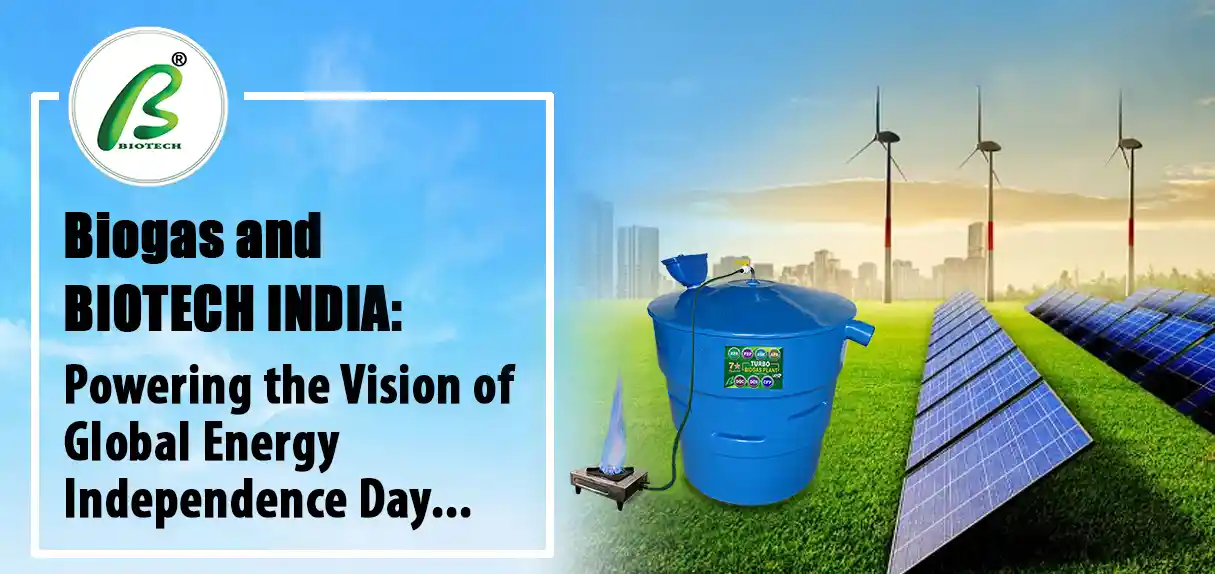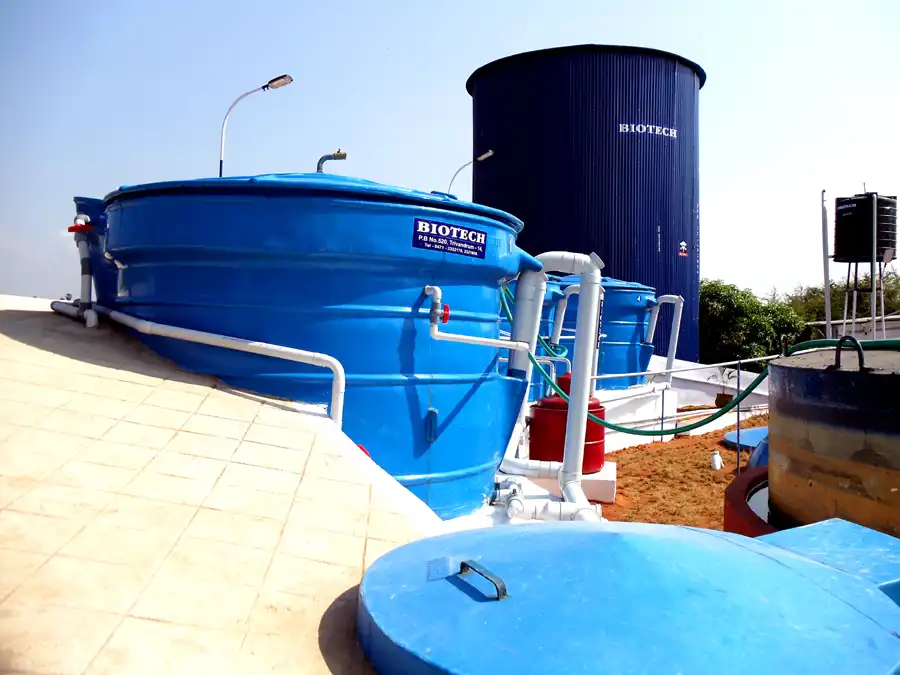
By Dr. A. Sajidas Managing Director, BIOTECH INDIA Renewable Energy International Consultant - Biogas, Organic Waste Management & Sustainable Development
As the world grapples with climate change, energy insecurity, and mounting waste, the call for clean, decentralized, and sustainable energy solutions has never been louder. Global Energy Independence Day, celebrated on July 10, is more than a symbolic date-it's a global movement urging us to break free from fossil fuel dependency and embrace renewable alternatives. Among the most promising solutions in this transition is biogas, and in India, one organization stands out for its pioneering work in this field: BIOTECH INDIA.
This blog explores how biogas technology-and specifically the innovations of BIOTECH INDIA-is helping to realize the vision of energy independence, environmental sustainability, and community empowerment.
Observed annually on July 10, Global Energy Independence Day promotes the shift from fossil fuels to clean, renewable energy sources such as solar, wind, hydro, and biogas. The date honors Nikola Tesla, whose innovations in electricity laid the foundation for modern energy systems. The day serves as a reminder that energy should be clean, local, and accessible to all-not a source of pollution, conflict, or inequality.
Biogas is a renewable fuel produced through the anaerobic digestion of organic waste-such as food scraps, livestock manure, and agricultural residues. The resulting gas, rich in methane, can be used for cooking, electricity generation, heating, and even as a vehicle fuel (biomethane)
➣ Reduces fossil fuel dependence by replacing LPG, diesel, and natural gas.
➣ Cuts methane emissions from landfills and untreated waste.
➣ Supports decentralized energy systems, especially in rural areas.
➣ Produces biofertilizer (digestate), reducing the need for chemical fertilizers.
➣ Creates green jobs and supports circular economies.
Biogas is not just a waste management solution-it's a climate solution, a rural development tool, and a pathway to energy independence.
India, the world's third-largest energy consumer, is rapidly scaling up its renewable energy capacity. While solar and wind dominate headlines, bioenergy-including biogas is emerging as a critical pillar of India's clean energy strategy.
➣ SATAT Scheme: Sustainable Alternative Towards Affordable Transportation, promoting compressed biogas (CBG) production.
➣ National Bioenergy Programme: Supporting biogas, biomass, and waste-to-energy projects.
➣ National Biofuels Policy: Encouraging blending of biofuels in transport fuels.
According to the International Energy Agency, India is expected to account for over a third of global bioenergy demand growth between 2023 and 2030. But to meet these targets, India needs scalable, community-driven solutions-and that's where BIOTECH INDIA comes in.
Founded in 1994 and headquartered in Thiruvananthapuram, Kerala, BIOTECH INDIA has been a trailblazer in biogas technology and environmental innovation. With over three decades of experience, the organization has developed a wide range of biogas systems tailored for homes, institutions, and urban settings.
➣ Diverse Product Range: From Nano Biogas Plants for households to Turbo and Ultra models for larger applications, BIOTECH INDIA offers scalable solutions for every need.
➣ Award-Winning Impact: In 2007, BIOTECH INDIA received the Ashden Award (Green Oscar) for its outstanding contribution to sustainable energy and waste management.
➣ Community-Centric Approach: The organization emphasizes local manufacturing, training, and public awareness, ensuring that technology adoption is inclusive and impactful.
➣ Innovation-Driven: BIOTECH INDIA has developed 100% biogas engines, portable biogas systems, and composter gardens that integrate waste treatment with vertical gardening.
Their mission is clear: to make biogas technology affordable, accessible, and adaptable—from urban apartments to rural farms.


BIOTECH INDIA's biogas plants are now a common sight across Kerala and other parts of India. Here's how they're making a difference:


1. Household Energy Security
Nano biogas plants allow families to convert kitchen waste into cooking gas, reducing LPG use and saving money. These compact systems are ideal for urban homes with limited space.
2. Institutional Waste Management
Schools, hospitals, and hostels use larger biogas units to manage food waste and generate energy for kitchens and lighting. This reduces operational costs and landfill burden.
3. Agricultural Integration
Farmers use biogas plants to process livestock manure, producing gas for cooking and digestate for organic farming. This supports sustainable agriculture and reduces chemical input costs.
4. Urban Sustainability
Municipalities partner with BIOTECH INDIA to install decentralized biogas units that process market waste, improving sanitation and reducing methane emissions.
One of the most powerful aspects of biogas is its alignment with circular economy principles. Instead of treating organic waste as a liability, biogas systems close the loop by turning waste into energy and fertilizer.
➣ Input: Organic waste (food, manure, sewage)
➣ Process: Anaerobic digestion
➣ Output: Biogas (for energy) + Digestate (for soil)
This model not only reduces environmental pollution but also creates value at every stage-a win-win for the economy and the environment.
So how does all this tie into Global Energy Independence Day?
✅ Decentralized Energy
Biogas plants reduce reliance on centralized fossil fuel systems by enabling local energy production-a core principle of energy independence.
✅ Climate Action
By capturing methane and replacing fossil fuels, biogas significantly reduces greenhouse gas emissions, supporting the goals of the Paris Agreement and SDG 13 (Climate Action).
✅ Energy Equity
Biogas systems empower rural and low-income communities with affordable, reliable energy-advancing SDG 7
(Affordable and Clean Energy) and SDG 10 (Reduced Inequalities).
✅ Innovation and Resilience
Organizations like BIOTECH INDIA exemplify how grassroots innovation can drive national and global sustainability goals. Their work strengthens community resilience and fosters a culture of environmental
stewardship.
While the potential of biogas is immense, scaling it up requires coordinated action:
1. Policy Support
Governments must provide incentives, subsidies, and regulatory clarity to encourage biogas adoption-especially for small-scale and community-based systems.
2.Public Awareness
More people need to understand the benefits of biogas. Campaigns, school programs, and demonstration projects can help normalize its use.
3.Capacity Building
Training programs for technicians, entrepreneurs, and local governments are essential to ensure proper installation, maintenance, and scaling.
4.Research and Innovation
Continued R&D is needed to improve efficiency, reduce costs, and develop new applications-such as biogas- powered vehicles or grid injection of biomethane.
As we celebrate Global Energy Independence Day, let's recognize that the path to a cleaner, more resilient energy future is already being paved-by innovators, communities, and organizations like BIOTECH INDIA.
Biogas is not just a technology-it's a movement. It's about reclaiming control over our energy systems, reducing our environmental footprint, and building a world where waste becomes a resource and every household can be a power producer.
In the words of Nikola Tesla, "The present is theirs; the future, for which I really worked, is mine." Let's honor that future-by investing in biogas, supporting local innovators, and choosing energy solutions that serve both people and the planet.
Telephone: +91-471-2331909, 2321909, 2332179
E-mail: mailtobiotech@gmail.com


Ernakulam (Cochin)
Telephone: +91-484-4858695
E-mail: mailtobiotech@gmail.com


Kozhikode (Calicut)
Mob : +91-9446-000-962
E-mail: mailtobiotech@gmail.com


Telangana
Telephone: +91 40 29330078 , +919446000968
E-mail: gtp.nird@gmail.com

